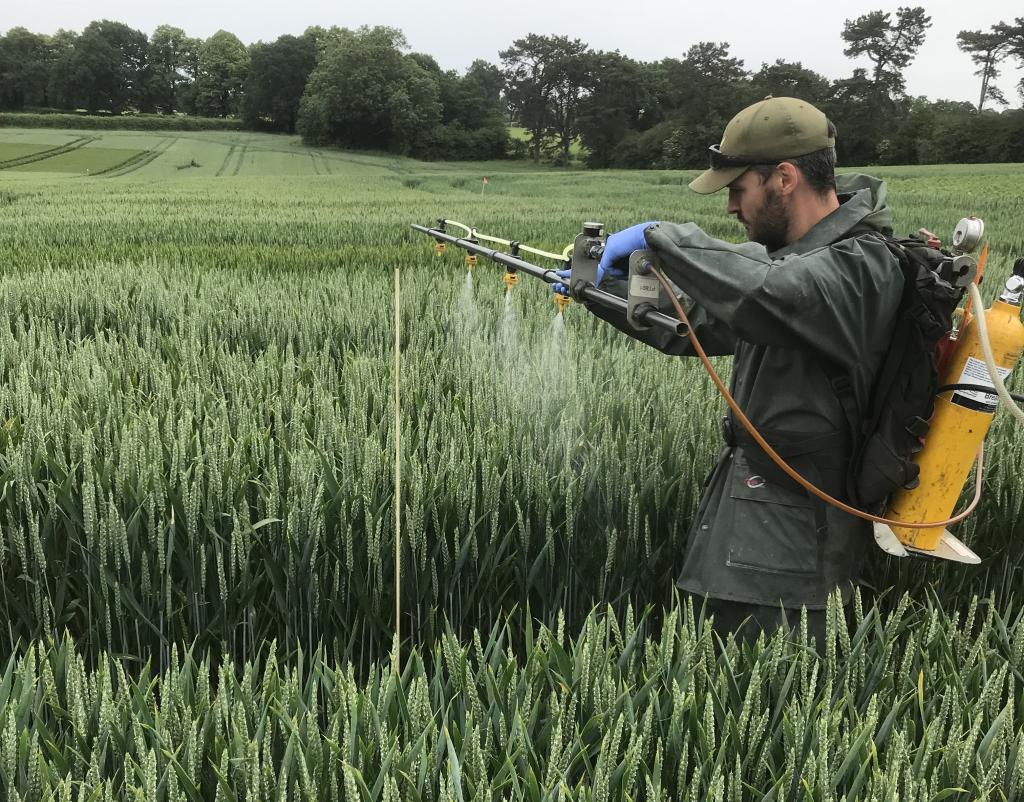The big picture: using wildflower strips for pest control
Enhancing wheat plants’ sugar signalling ability could deliver increased yields of up to 12%, according to a study from Rothamsted, Oxford University and the Rosalind Franklin Institute and published today in the journal Nature Biotechnology. That is an order of magnitude greater than annual yield increases currently being achieved through breeding.
The effect was achieved by applying a synthetic ‘pre-signalling molecule’ that releases trehalose-6-phosphate (T6P) in the plants. T6P is a signalling molecule that controls the plant equivalent of “blood sugar”. It is a major regulator of metabolism, growth and development including activating the pathway for the synthesis of starch, the world’s most significant food carbohydrate.
The link was discovered during research started at Rothamsted in 2006. Now a four year-long field study using plots at CIMMYT, Mexico and INTA, Argentina has confirmed that the new technology could deliver major yield improvements.
%2C%20and%20sorghum%20panicles%20(right%20panel)%20showing%20the%20yield%20increase%20caused%20by%20applications%20of%20the%20novel%20trehalose%206-phosphate-based%20biostimulant.png)
Wheat has complex genetics and targeting genetic bottlenecks in germplasm makes improvement through breeding far from straightforward. Instead, this chemical method for releasing T6P in response to sunlight acts as a direct switch for driving starch biosynthesis in grain, which forms the basis of wheat yields. This in turn this stimulates photosynthesis in the flag leaf, due to greater demand for carbon building blocks for grain filling.
This work provides an excellent example of where direct selective manipulation of key molecular structures, rather than genetics or gene editing, is a game changer
The study also suggests that it may now even be possible to reduce fertiliser applications in the search for higher yields – this treatment with a pre-signalling molecule of T6P also activates genes for amino acid and protein synthesis in grain as well as the pathway for starch synthesis. Currently, new higher yielding wheat varieties suffer from dilution of protein content requiring increased fertiliser to maintain quality for bread making – by solving this problem and unlocking our dependence on fertiliser this treatment set a new path to more sustainable agriculture and with a reduction in the associated greenhouse gas emissions caused by fertiliser production.

Rothamsted and Oxford have created SugaROx, a spinout company, to deliver this research to farmers. Dr Cara Griffiths, lead author of the research paper and CEO of SugaROx, said, “It’s exciting to be able to take cutting edge technology from the bench to the field. Getting this kind of impact is often difficult to translate to the field, and this work demonstrated that novel crop inputs have huge promise to enhance yield and resilience in our cropping systems, something that is particularly important in a rapidly changing climate”.
“The path from discovery to translation has taken 25 years” says Rothamsted’s Dr Matthew Paul who led the research along with Professor Ben Davis at The Rosalind Franklin Institute and Oxford University. “Such timeframes are not untypical in blue-skies plant research, but we do hope new technologies, such as AI and faster analytical techniques, can accelerate this process. We will need many more innovations like this to create sustainable and resilient agriculture in the coming decades. I am so grateful to my excellent people, co-workers and teams and for grants from UKRI-BBSRC which made this work possible. Getting this far has been hard work but extremely rewarding”.
“This work provides an excellent example of a case where direct selective manipulation of key molecular structures, rather than genetics or gene editing, inside a living system is a game changer," said Professor Davis. "It has been really very inspiring to design and discover this new class of ‘drug for plants’ together.”

Plant Scientist

Molecular Biologist - Biochemist
Rothamsted Research is the longest-running agricultural research institute in the world. We work from gene to field with a proud history of ground-breaking
discoveries in areas as diverse as crop management, statistical interpretation and soil health. Our founders, in 1843, were the pioneers of modern
agriculture, and we are known for our imaginative science and our collaborative approach to developing innovative farm practice.
Through independent research, we make significant contributions to improving agri-food systems in the UK and internationally, with
economic impact estimated to exceed £3 bn in annual contribution to the UK economy. Our strength lies in our systems approach, which combines strategic research,
interdisciplinary teams and multiple partnerships.
Rothamsted is home to three unique National Bioscience Research Infrastructures which are open to researchers from all over the world:
The Long-Term Experiments,
Rothamsted Insect Survey and the
North Wyke Farm Platform.
We are strategically funded by the Biotechnology and Biological Sciences Research Council (BBSRC), with additional support from other national and
international funding streams, and from industry. We are also supported by the Lawes Agricultural Trust (LAT).
The Biotechnology and Biological Sciences Research Council is part of UK Research and Innovation, a non-departmental public body funded by a grant-in-aid
from the UK government.
BBSRC invests to push back the frontiers of biology and deliver a healthy, prosperous and sustainable future. Through our investments, we build and support a vibrant,
dynamic and inclusive community which delivers ground-breaking discoveries and develops bio-based solutions that contribute to tackling global challenges,
such as sustainable food production, climate change, and healthy ageing.
As part of UK Research and Innovation (UKRI), we not only play a pivotal role in fostering connections that enable the UK’s world-class research and innovation system
to flourish – we also have a responsibility to enable the creation of a research culture that is diverse, resilient, and engaged.
BBSRC proudly forges interdisciplinary collaborations where excellent bioscience has a fundamental role. We pioneer approaches that enhance the equality, diversity,
and inclusion of talent by investing in people, infrastructure, technologies, and partnerships on a global scale.
The Lawes Agricultural Trust, established in 1889 by Sir John Bennet Lawes, supports Rothamsted Research’s national and international agricultural science through the provision of land, facilities and funding. LAT, a charitable trust, owns the estates at Harpenden and Broom's Barn, including many of the buildings used by Rothamsted Research. LAT provides an annual research grant to the Director, accommodation for nearly 200 people, and support for fellowships for young scientists from developing countries. LAT also makes capital grants to help modernise facilities at Rothamsted, or invests in new buildings.